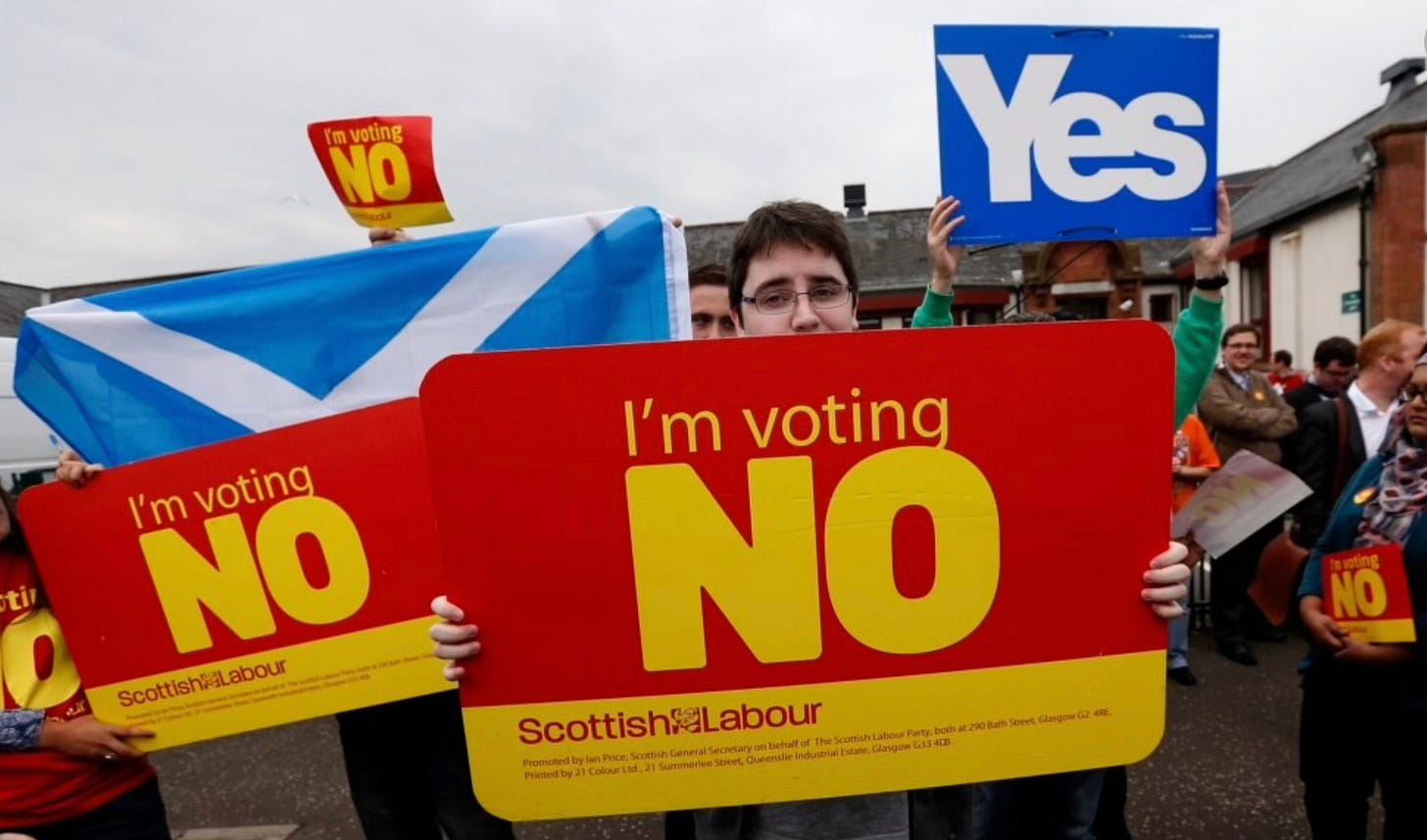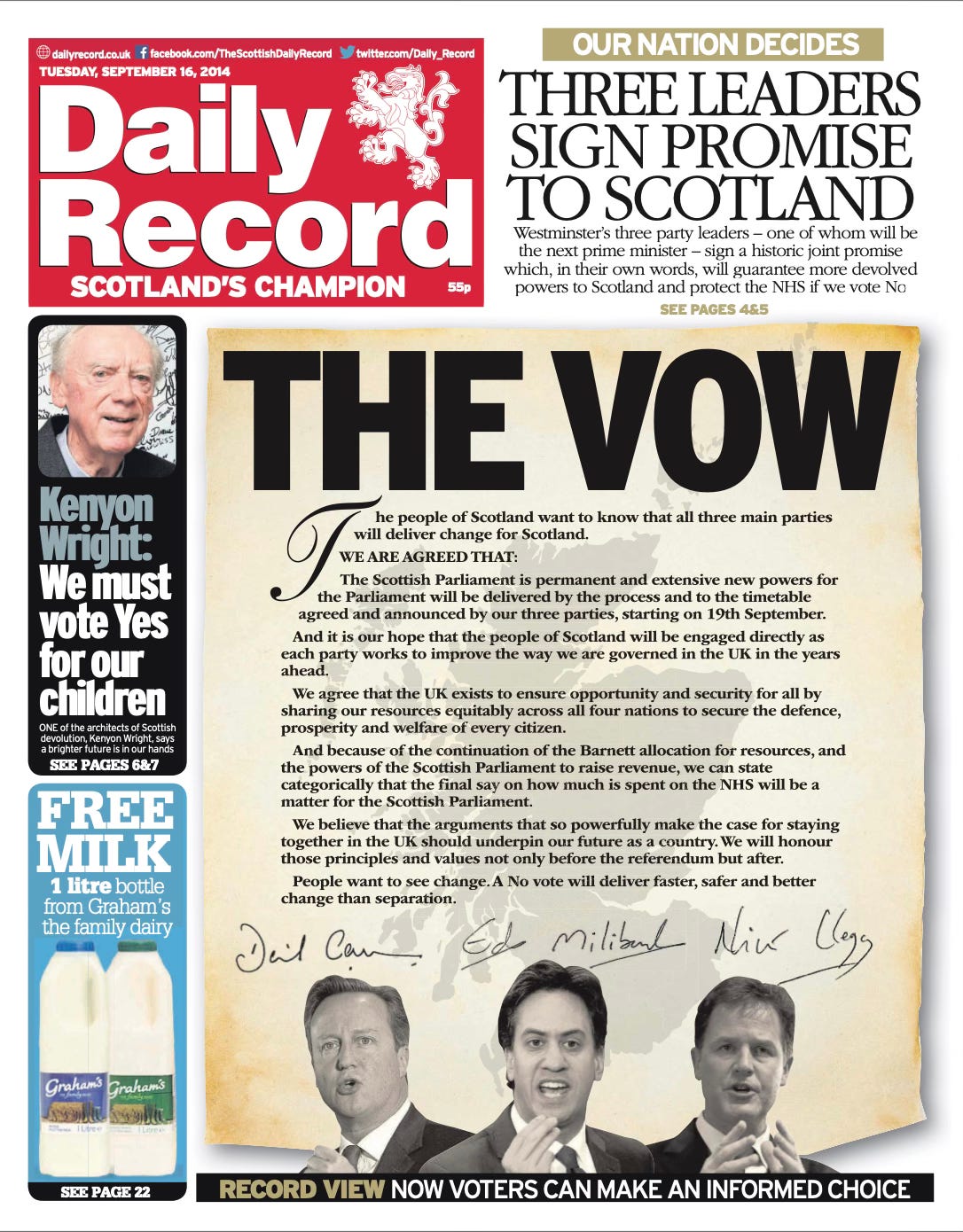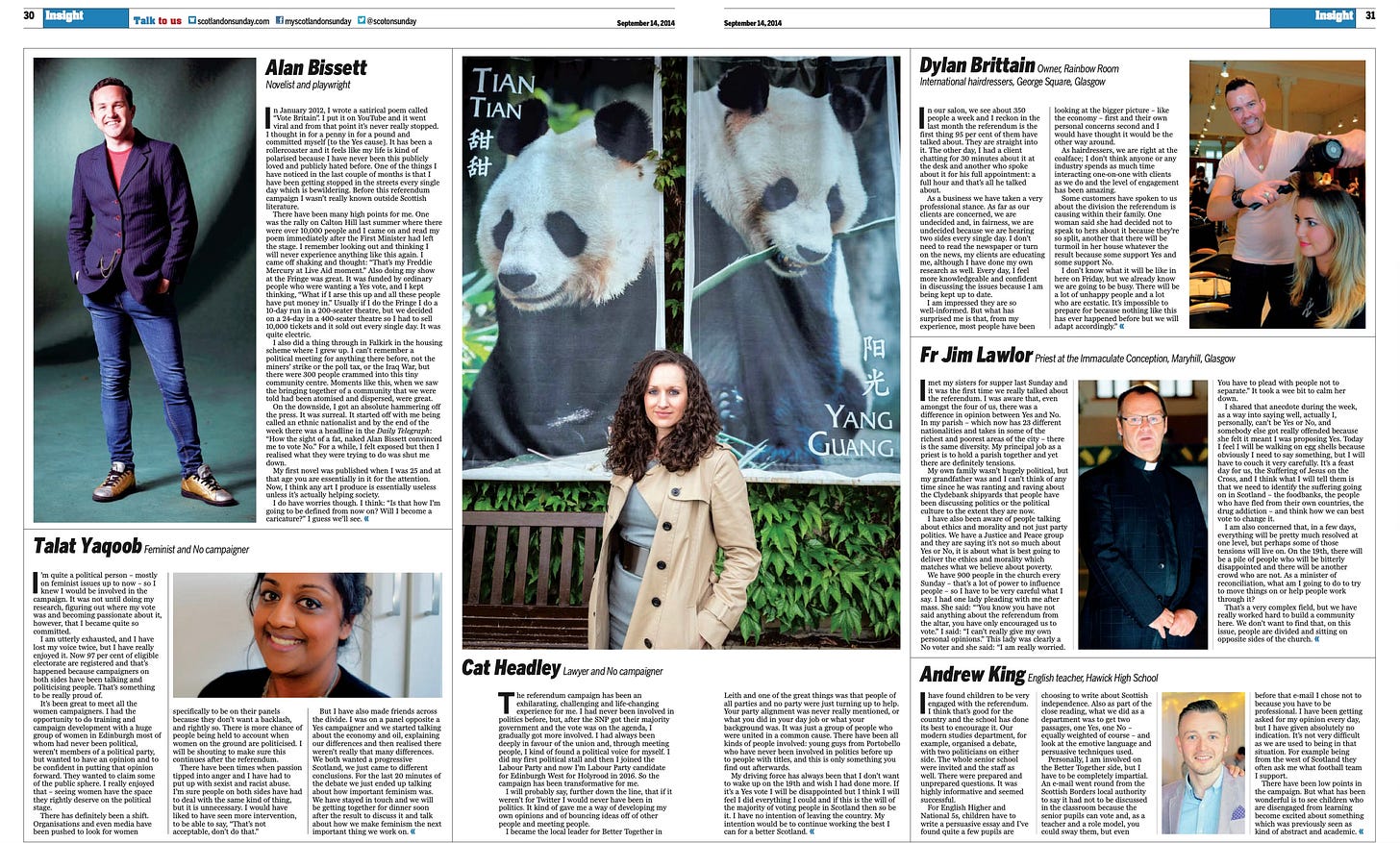Scotland's independence referendum, ten years on
I revisit a newspaper leader I wrote on the eve of a historic vote
Ten years ago, on September 18, 2014, there was a referendum in Scotland on whether or not to break up Britain. The question on the ballot paper was simple: “Should Scotland be an independent country?” Voters were invited to answer Yes or No.
At the time I was deputy editor of The Scotsman, one of Scotland’s national newspapers. Much of my time was spent editing its sister paper, Scotland on Sunday.
I recall walking to work early on voting day in a state of mind that felt like euphoria but which was probably just exhaustion. I had no idea what the result was going to be but I was contentedly resigned to whichever future lay ahead. My emotions felt very very close to the surface. It is not every day a nation decides its fate in this way. I resolved to use all the energy I could muster to get behind whatever decision voters made: establishing an independent Scottish state or remaining within the United Kingdom.
I had my own views. A few days earlier, on the weekend before the vote, Scotland on Sunday ran a full-page leader column setting out the paper’s position. I wrote that leader. I recall being pleased with how it turned out. Ten years on, I thought it might be interesting to revisit it.
Are the arguments I made still valid? Does the case I made stand the test of time? What did I miss?
Here is the leader that appeared in Scotland on Sunday on September 14, 2014. Below it, I will discuss what I got right, and what I got wrong.
Scotland can be changed for better with a No vote
New powers on offer will give Holyrood the toolkit to build the country we all want to live in
The Yes campaign’s strongest argument for independence is also its simplest — that Scotland should be run by the people who live here. On Thursday, many Scots will vote Yes for this reason, and for this reason alone.
It is an honourable view. It is not necessarily blind to the potential problems of independence, but sees them as secondary to the principle of sovereignty. Problems, after all, can be faced down and — on a good day — overcome. What matters, according to this way of thinking, is to be in full control. It is an appealing view. But it contains a flaw. It ignores an inconvenient truth.
That truth is that very few nations exercise full control over their own affairs. The 19th century idea of the nation state is dead and gone.
What modern nations do now, in the 21st century, is to pool sovereignty with their neighbours. Some powers are retained, and some are willingly shared.
Shared sovereignty was a concept alien to the Scottish National Party in its early years. Its vision was the 19th century nation state, fully sovereign. It was an insular and isolationist view of the world.
Yet eventually the SNP’s thinking matured and embraced the idea of Scotland working in union with other nations.
First the nationalists wanted an independent Scotland to adopt the euro, surrendering key aspects of financial sovereignty to be part of a currency union across the European continent.
When the euro project turned sour, this thinking was transferred to the idea of an independent Scotland sharing the pound in a currency union with the rest of the UK.
Surrendering sovereignty has become a leitmotif of modern Scottish nationalism. Opposition to membership of Nato has been ditched, committing Scotland to the shared defence of all 28 other Nato members. The modern nationalist vision includes membership of the European Union, ceding sovereignty to Brussels. The SNP now embraces the monarchy, proposing that an independent Scotland share the Queen as head of state with the rest of the UK. Macroeconomic and monetary policy would be surrendered to the UK Treasury and the Bank of England. There would be a shared regulatory framework for banks and financial services. And so on.
These were the right decisions for the SNP. It makes sense that a small nation on the northern half of an island, on the geographical periphery of Europe, should first share sovereignty with the other inhabitants of that island, and then with the other nations of the continent. This makes sense.
But does it require independence? There are differing views on what now constitutes the optimum level of powers for a small, modern European nation. But it is clear Scotland currently falls short.
For decades this newspaper has argued that not enough power is exercised at a Scottish national level — in Scotland, by Scots, for Scots.
From the moment our first edition hit the streets in 1988 we argued passionately for Scottish home rule. And once the principle of a Scottish Parliament was won we argued for it to have more powers than the Labour party was then willing to give it.
The phrase ‘devo max’ was introduced and championed in our leader columns.
Today we still believe the Holyrood parliament needs wider competencies and greater financial powers — not for their own sake, but to ensure greater accountability, greater responsibility and more effective government.
The optimum balance of powers retained and powers willingly shared has not yet been achieved in Scotland. So how do we achieve it?
There are two ways. We can either accrue powers, building on what we already have at the moment, while staying in the UK. Or we can have full independence, then shed sovereignty until we settle at a more suitable level.
This is the heart of the decision each Scot will take this week: do we add powers to a devolved Scotland, or subtract powers from an independent Scotland?
This may seem a surprisingly cool and detached way of looking at the referendum, given the passions raging in the campaign.
But certain passions are best put aside when we pick up the pencil in the voting booth on Thursday. Passions kindled by ancient antagonisms and centuries-old hurts. Resentments about a perceived English colonialism that supposedly holds back Scottish culture. A self-regard that sees Scots as morally superior to their southerly neighbours. A toxic strand of nationalism that is capable of regarding fellow Scots as quislings and traitors. These are passions we can do without.
And yet one passion should, this newspaper believes, be embraced on 18 September. That is a deep desire to see Scotland move forward united, not as two warring tribes, but as one Scottish nation.
Of the two paths that lead to the optimum powers for the Scottish Parliament, only one is a route that we can travel as Scotland United.
If we vote Yes on Thursday the margin of victory is likely to be extremely small. We shall start life as a new state divided against ourselves.
In the difficult birth — the potential problems with currency, the EU and Nato have been well aired and do not need repeating here — those divisions are more likely to deepen than to heal. There will be recrimination and reckoning. If you doubt this, ask Jim Sillars.
Despite the assurances of Alex Salmond, the process of negotiation with London will be fraught and bitter. Each side will fight their corner with cold ruthlessness — we will expect that of our negotiators, as the rUK public will of theirs. All will be played out against a background of financial turmoil. Serious damage will be done to Anglo-Scots relations. It is entirely possible that by the end of negotiations in 2016, majority backing for independence will have disappeared. But by then it will be too late.
A No win, too, is likely to be narrow. And it will hard to thole for those who voted Yes. But the independence dream will not die. There will be other referendum days. One of the SNP’s great contributions to Scotland’s story has been as ‘The Power For Change’. Nationalists can reclaim this role after a No vote, in the Scottish national interest. In the meantime we can all shed the binary black-and-white politics of Yes and No and rediscover instead what we have in common.
If we vote No the nation can once again coalesce around the constitutional option that has been the Scottish public’s preferred choice for a decade: a much stronger Holyrood parliament, within the UK. Instead of facing the future as a country split right down the middle, 50–50, we can move forward with an overwhelming majority getting behind the creation of a powerhouse parliament at Holyrood. We can face the future united, not divided.
Alex Salmond has played on public distrust of the political classes to sneer at promises of more devolution for Scotland. Scepticism is a virtue, but a categorical manifesto commitment by all three UK party leaders of more powers over tax, welfare and jobs cannot be so easily dismissed.
The UK parties have delivered on devolution: in 1999, with the creation of the Scottish Parliament; in 2004, when Alistair Darling transferred new rail powers to Holyrood; and in 2012, when a new Scotland Act handed over new income tax and borrowing powers, plus stamp duty and other taxes. In the same period, Wales and Northern Ireland have won their Assemblies. Devolution has been offered to English regions and cities. Last year the current UK administration authorised substantial new financial powers for Wales. This track record cannot be denied. There is absolutely no reason to suppose this process of decentralisation will now stop. On the contrary, the dynamic in the whole of the UK is now a move to asymmetric federalism.
This eclipses dim and dusty memories of a broken Tory promise by Sir Alec Douglas-Home in 1979, a date that is chronologically closer to the Second World War. In the 1990s Alex Salmond famously said that Labour “couldn’t deliver a pizza, never mind a parliament”. It was a great line from a great communicator. But he was wrong then and he is wrong now.
One of the most common mistakes of this campaign is to claim that a ‘more powers’ option has been kept off the ballot paper. This is not the case. That option is now there, in black and white. It is a vote for No.
Choosing to stay in the UK instead of turning our backs is the right thing to do. And not just because of the political solidarity and common endeavour within Britain that would be lost with a Yes.
We Scots are comfortable with our rich, complex, multi-layered identity: Scottish first and foremost, always; but happy as well to belong to the British family of nations, within a wider union across Europe. And that’s before we add in other kinds of belonging, as a Glaswegian, a Dundonian, a Highlander, a Fifer. Why should one important layer of our identity — Britishness — be denied democratic expression? It makes no sense.
This newspaper believes the path we take this week should be chosen in a way that minimises division. We should take a path we can walk with as much unity as possible, as Scots, on the next leg of our shared, common journey.
Nationalists argue that Scotland must grab full sovereignty before surrendering it to get to the optimum level. But why? Is it really so vital that for one tiny moment in time, Scotland has these full powers, before almost immediately handing many of them away?
Some Scots will say a retooled Holyrood within the UK cannot go far enough to satisfy them — for example on defence. Again, this is an honourable position. But is the difference really worth the convulsion within Scotland, and the rupture with the rest of the peoples of the United Kingdom, that a Yes vote would bring? Is it really worth the gamble with jobs, the gamble with security, the gamble with prosperity? Do we really want a Scotland which, as one MP tweeted last week, has more pandas than banks? For a minority of Scots, defence is a deal-breaker. For the majority of us, however, other considerations are more important. Scotland can be changed for the better with a No vote.
The vast majority of the hopes expressed by Yes activists in this campaign can be achieved with the bold application of powers that will shortly be at Holyrood’s disposal. This newspaper agrees with the Yes campaign that a better Scotland is within our grasp. A more confident, assured and can-do Scotland. An optimum Scotland. But we cannot agree this Scotland is dependent on us choosing independence. That would be to underestimate the people of this country. And that is not a wise thing to do.
Our Scotland is a tremendous country. Ambitious, audacious, brimful of ideas. Flawed, certainly, and sometimes infuriating. But its flaws are our flaws and we have no-one to blame for them except ourselves. They are not the fault of the English. They are not the fault of Westminster. They are the product of our own failings, and failures to act. The powers we have at the moment, strengthened with the powers promised, give us the toolkit we need to build a better future for Scotland, if we have the will.
But first we have to choose to go forward not as two Scottish tribes but as one Scottish nation. Scotland United, within a United Kingdom.
Re-reading this last paragraph I feel a deep sadness. Because a nation divided between two tribes is exactly what happened. By the time I wrote those words the damage had already been done. The 2014 campaign had divided Scotland in two, with each side regarding the other with disdain and often with hostility. That persists today.
Scotland voted no to independence, by 55 per cent to 45 per cent. Ten percentage points was both a comfortable margin of victory and simultaneously much closer than many people expected. For much of the past decade that split has defined our politics, in large part dictating which parties we vote for in parliamentary elections. The most recent Westminster election is an exception to this rule but may yet prove to be an outlier.
Was my hope of a Scotland United naive? I hope not. I still think it is possible for a comfortable majority of Scots to lend their consent to a way forward for Scotland that meets many of the aims of both sides. But we are clearly not there yet.
What else did I get wrong? The big factor I failed to foresee was Brexit. To be fair, few people in 2014 expected there to be a referendum on UK membership of the European Union. Those who thought it a possibility were convinced the case for leaving would fail.
Nevertheless, Brexit makes a big dent in the case I put forward in this leader. My key argument was that a small, modern, 21st century nation thrives by sharing sovereignty with its neighbours. The rejection of that idea in a European context flips the argument. It allows Scottish nationalists to argue that independence is required to rejoin the sharing union of European nations, albeit ignoring the need to share with our immediate neighbours on this island first.
I would argue it is more important to share chores with the folk living in your own tenement stair rather than the tenement across the street, but I cannot deny that Brexit makes this a harder sell.
I am on firmer ground with my toolkit argument. In the final days of the campaign, the three leaders of Britain’s main unionist parties joined together to produce The Vow. On the front page of the Daily Record they promised more powers for Holyrood to make it a powerhouse parliament.
That promise was, in large part, delivered. The referendum was followed by the Smith Commission that beefed up the Scotland Act, notably on tax and welfare, but also on competencies such as abortion. Scotland now has its own income tax regime with higher rates for those on above-average incomes. We also have our own welfare system spending billions of pounds a year, with Scotland-only benefits such the child payment making a very real dent in child poverty.
In my view there is still some distance to go. In this I am at least consistent. For more than 30 years my position on the constitution has been pretty much the same: ahead of where the Labour party would take us but but short of where the SNP would like us to go. For me this is the sweet spot in Scottish politics, where a lasting consensus is still achievable.
Another observation on re-reading the leader is how far the SNP has now shifted on the crucial issue of currency. SNP policy in 2014 was to share the pound in a UK currency union, with island-wide financial regulation. SNP policy now is to move as quickly as practicable to a new, sovereign, independent Scottish currency, as yet unnamed. I see this as a retreat from the more expansive version of independence on offer in 2014. The offer now is more narrow, more isolationist, more nationalist.
I am conscious some readers might see similarities between the leader and the political columns I write these days for The Times. This should not be a surprise. My politics and the politics of Scotland on Sunday were closely aligned. I was the paper’s political editor for a key period in the 1990s when the devolution settlement was taking shape. It was during this time that the paper’s political outlook was formed: small-n nationalist in tone, contemptuous of the Scottish cringe, not wholly hostile to independence, while arguing for a powerful Scottish parliament within the UK.
I think you can see this in the way the leader looked at independence within the context of the SNP’s journey from nation-state nationalism to being pro-Europe, pro-Nato, pro-monarchy and pro-sterling. The leader accepted many of the foundational arguments of the nationalist cause, then questioned their application.
A useful way of thinking about Scotland on Sunday’s positioning at the time is to revisit what was then known as “the Lorraine Mann question”. Lorraine Mann was an environmental campaigner who appeared on a TV politics programme in 1995 in which the audience quizzed Labour’s George Robertson and the SNP’s Alex Salmond.
Her question went like this:
“I’d like to ask a question to both of the gentlemen really, and I think it should be a fairly straighforward and simple one to answer. What is your second choice? We know what your first choice is. We have independence, devolution or the status quo. What is your second choice?”
Salmond, of course, had no hesitation is saying “devolution” was his second choice. For Robertson it was an impossible question, because it would have been politically disastrous for him to answer “the status quo”. So Robertson instead just blustered.
You can find it here, at 44 minutes:
At the time, with Scotland governed by direct rule from London, I would have had no hesitation in saying my second choice was independence. My newspaper’s answer to the Lorraine Mann question was never explicitly spelt out, but in my mind the answer was the same.
I often hear independence supporters lamenting that the Scottish media is so biased against them. I think this is a failure to understand Scottish history. Every Scottish newspaper brings its own story to the constitutional question. The Scotsman was founded in 1817 and has played a role in all the great political debates of the past two centuries. It has been a doughty campaigner for home rule within the UK since before the SNP was even founded. You cannot expect such an institution to leave its history at the door at the start of an independence referendum. The rise of nationalism as a substantial parliamentary force is a recent phenomenon and it will take time for institutional Scotland to catch up.
Having said that, my colleagues and I worked hard to ensure referendum analysis and commentary in both The Scotsman and Scotland on Sunday in 2014 was evenly divided between the two sides. There was an equal number of columnists arguing Yes and No. Big specials on defence, currency, Europe and the like were scrupulous in giving equal space to both sides.
For example, here are the Insight pages for that same pre-vote issue of Scotland on Sunday:
News coverage was different. Most news stories were in some way critical of the independence case. I would argue this was an inevitable structural consequence of holding a referendum on a constitutional change that would be a social, financial and political convulsion. Inevitably much of the debate was testing the proposition. Independence supporters had to make a convincing case and answer legitimate questions. Ultimately they failed to persuade enough people to take the leap.
Back to the leader column. I still stand by it. There is little I would change. In the context of that moment in 2014 it was a strong case and I am pleased with the way it was made. I doubt it changed many minds, or any minds. The aim was to counter the negativity of No campaign and frame the argument in a way that made it easier to make a positive and constructive case for staying put.
Where stands Scotland now? Last month’s Westminster elections that saw the number of SNP MPs fall to nine may signal a material change in mindset or they may not. It is too early to tell. Despite this setback for the SNP, support for independence remains around 45 per cent.
Ten years on from the indyref, Scotland is still living in its shadow.
-o0o-
What’s your view? Have your say. Use this button:
Why not share this post on your social media? Use this button:
Are you a paid subscriber to The Jaggy Thistle? If so, thank you! If not, would you consider becoming a paid subscriber and supporting my journalism?
Become a subscriber, or upgrade to a paid subscriber, by using this button:
-o0o-
“A chield’s amang you takin notes, And faith he’ll prent it.”
Robert Burns
-o0o-












I was born in England (to English parents) but brought up and educated in Scotland. I moved south of the Tweed on graduation and viewed the referendum from afar as a passionately interested non-voter. I had (and have) friends and family on both sides of the debate and, as you acknowledge, those positions have only hardened in the decade since. I think your editorial was passionate and brilliantly argued, albeit to a Scotland which you think had moved on from the position you were arguing to maintain.
My own view - of Indy and Brexit - is that referendums divide us in a way that I think is unhealthy. Whatever your views of the outcomes, our politics is more divided and more toxic as a result. I wish neither had happened.
Thanks Kenny. I had forgotten we were approaching the anniversary of Indyref. More to do with the volume of things we’ve dealt with since Sept 2014.
Your desire for a united Scotland is admirable but now looks quaintly naive. My recollection is 2014 was the first social media vote. We quickly got into our camps and stayed there. I was taking a friend of my son home from sports and we got chatting. His view - Yes was winning due to all the social media he had seen. I countered that most people weren’t on Twitter or Facebook but he was having none of it. I still bristle when I hear that Indyref was a joyous occasion. It certainly wasn’t for No voters
Talking of Brexit, I do believe that the leave campaign learned all the right lessons from 2014 and deployed them to devastating effect.